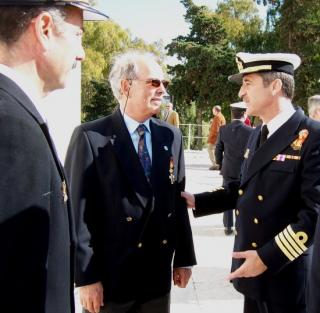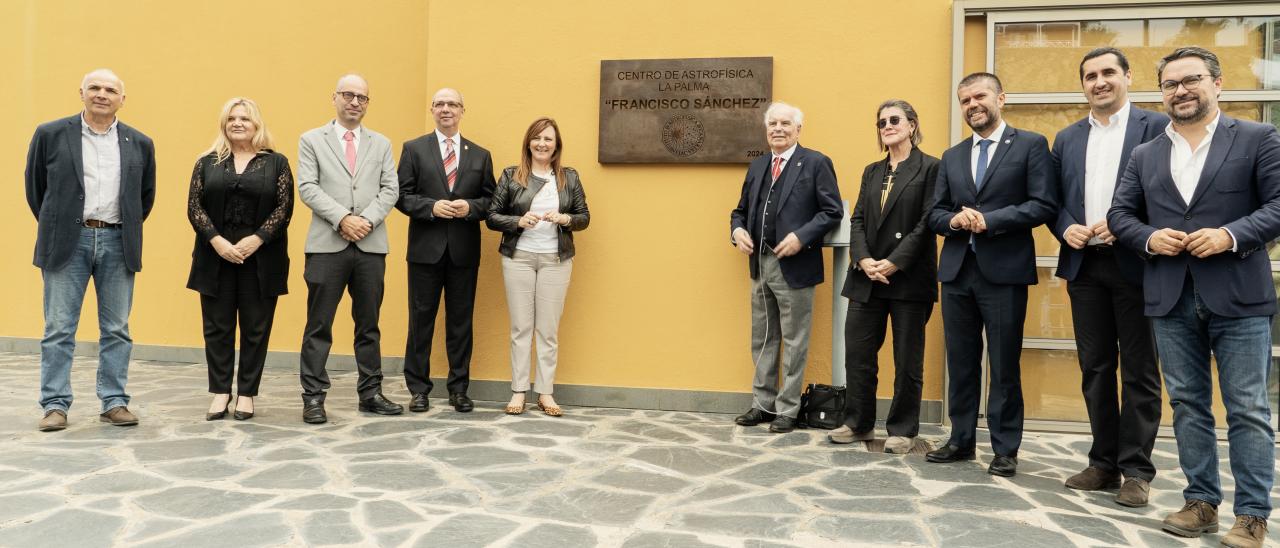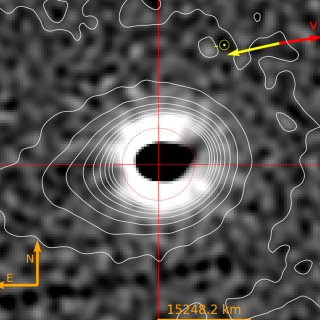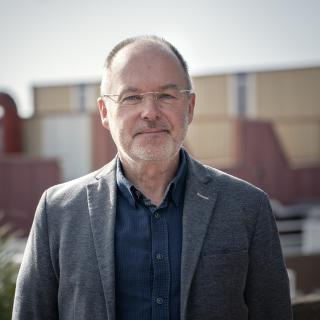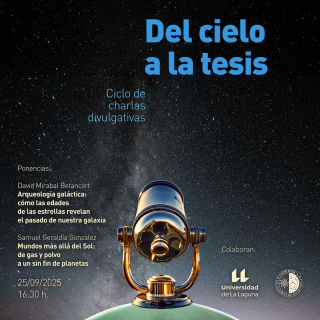The Deputy Director of the IAC, Casiana Muñoz Tuñón praises the bravery and persistence shown by Francisco Sánchez which enabled the IAC to be recognized as one of the best centres in the world for research in astrophysics.
The Instituto de Astrofísica de Canarias (IAC) hosted this morning the ceremony to rename the Centre of Astrophysics on La Palma (CALP) as CALP Francisco Sánchez, in honour of the person who was the first Professor of astrophysics in Spain, and the founder of the IAC.
Those taking part in the ceremony included the Founding Director of the IAC, Francisco Sánchez Martínez, the Deputy Director of the IAC, Casiana Muñoz Tuñon, the Councillor of the Presidency, Public Administration, Justice, and Security of the Government of the Canaries, Nieves Lady Barreto, and the first Vice-President of the Cabildo of La Palma, Juan Ramón Felipe San Antonio.
Other participants included the Special Commissioner for the Reconstruction of La Palma, Héctor Izquierdo, the Island Director of the General Administration of the State on La Palma, Ana María de León, the Mayor of Breña Baja, Borja Pérez Sicilia, the hMayor of Garafía, José Angel Sánchez, and the Mayor of Santa Cruz de La Palma, among the other authorities.
The Deputy Director of the IAC Casiana Muñoz Tuñón thanked Francisco Sanchez for his presence and said that without his abilities, his work, and his persistence, the IAC would not have existed as the recognized international centre it is today. Casiana reminded us that in only a few decades the IAC has gone from being sited in primitive prefabs to an international centre of excellence, with three headquarters and two observatories, in which La Palma has played an outstanding role. “We can say that this expansion has allowed the IAC to be the central site of projects in the forefront of international research, such as the CTA which is now at a very advanced stage of construction at the Roque de los Muchachos, and which will be the most powerful gamma ray astronomical observatory in the world” she added.
Francisco Sánchez said he was grateful for this renaming, and stated that “There is no doubt that the IAC has put La Palma on the world map of science, technology and astro-tourism. Now this small island in the Atlantic has become very special and known all over the world.” The Founding Director also said that he was “convinced that with this great centre for astrophysics, La Palma has an exceptional chance of becoming a “Silicon Valley.”
The Vice-President of the Cabildo of La Palma, Juan Ramón Felipe San Antonio said that with the renaming of these installations as CALP Francisco Sánchez“ the historic and scientific link between the IAC and La Palma, in which the person we honour today has been fundamental, has been strengthened”. Now, said Felipe San Antonio, as the leading institution on La Palma “We continue to place hope in the economy of knowledge, characterized by the importance of human capital, research and development, innovation and technology.” In this area he pointed out that “the IAC will continue to be fundamental, as it drives a common interest in the development of astrophysics in La Palma, recognizing its importance in the economy and the society of the Island, and the commitment of both institutions to science and technology” also pointing out that “it is important to make the event and discoveries on the mountain tops of the Island accessible to its citizens and encourage their participation."
Finally the Councillor of the Presidency, Public Administration, Justice and Security of the Canary Government, Nieves Lady Barreto praised the figure of Francisco Sánchez, whom she described as “in love with the sky, especially the Canary sky, a person who has dedicated his life to make the observatories on Tenerife and La Palma internacional references, something which is easy to say, but very difficult to achieve." She also stressed that “our reference is, above all, the sky. We cannot be complacent about ourselves, we need to keep advancing, following the path to follow to make our dreams a reality.”
Pioneer and promotor of Spanish astrophysics
Francisco Sánchez (Toledo, 1936) is one of the pioneers and promotors of Astrophysics in Spain since, in 1961 he travelled for the first time to Tenerife, to start his first studies of the astronomical quality of the Canary skies.
Firmly convinced that the Canary skies are exceptional for astronomical observation, in 1964 he managed to get the University of Bordeaux to instal the first professional telescope at the Teide Observatory. This was an international agreement which underlies all the subsequent agreements which allowed the installation of international telescopes, in exchange for 20 % of the observing time for Spanish science.
Francisco Sanchez also formed the first group of research in astrophysics in Spain, the group of “High Atmosphere and the Interplanetary Medium” and the first doctoral theses were writted.
In 1965 he joined the University of La Laguna (ULL) as adjunct Professor of Physics at the Observatory of the Teide, and in 1969 he defended his doctoral thesis, the first in Astrophysics defended in Spain. From that point began a long route; in 1970 the first Associate Professorship in Physics in a Spanish university was created at the ULL, and occupied by Francisco Sanchez, who became the first full Professor in 1974.
Since 1971 Francisco Sánchez has been a member of the International Astronomical Union (IAU). One year before the first use of the new international telescopes at the Teide Observatory, and when the European Solar Physicists within the JOSO organization began their first site prospection at the Roque de los Muchachos in La Palma, seeking the best sites for their instruments.
In 1973 Sánchez` initiative brought about the creation of the University Institute of Astrophysics at the ULL, which was the precursor of the present IAC.
In 1976 the work on the access road to the Roque de llos Muchachos was started in La Palma, with the building of a forest track, which was completed in 1978, and gave rise to the start of the present Roque de los Muchachos Observatory, which has become one of the most important in the world.
Another of Francisco Sanchez’ major achievements was, in 1988, the passing of the Law for the Protection of the Astronomical Quality of the Observatories of the IAC, commonly called the Law of the Sky, which made the Canaries the first Autonomous Community which limited the levels of artificial lighting to avoid light pollution of the sky.
During those years the IAC made a long list of instrumental and scientific achievements, not only with its observatories but also with the collaboration in projects such as the satellites ISO and SOHO.
Among his many achievements we should pick out the fact that Francisco Sánchez was the force behind the construction and the initial use of the Gran Telescopio de Canarias, through the commercial company GRANTECAN S.A:, which was inauguratedin 2009, and which is still, today, the biggest telescopein the world operating in the visible and near infrared, situated at the Roque de los Muchachos.
In 2007 Francisco Sánchez participated in the International Starlight Conference in La Palma, from which emerged “The declaration in defence of the night sky, and the right to starlight”.
In 2011 he promoted the creation of the Starlight Foundation, with the aim of spreading the message of the principles of the La Palma Declaration. In the same year, in the first Starmus Festival, Francisco Sánchez participated in a historic debate in the dome of the Gran Telescopio Canarias, together with well known astronauts and Nobel Laureates.
In 2013 Francisco Sanchez finished his time as Director of the IAC, and passed the baton to Rafael Rebolo. In the following years he participated in conferences and received many distinctions for his professional career. In 2019 he published the book “Dreaming Stars” an auobiographical story which shows his love of the universe and his commitment to Spanish astronomy.
Among his distinctions, Francisco Sánchez has won the Premio Canarias for Research, and is a member of the Real Sociedad de Amigos del País, since 1985, and of the Canary Academy of Sciences since 1987. He is also a vicepresident of the European Astronomical Society (EAS) since 1994, belongs to the Advisory Council on Science Technology, and Innovation since 2003, and the Committee of the Area for Science and Society of the Ibero-American Programme of Science and Technology for Developemnte (CYTED) since 2005.
Pictures and videos of the event

